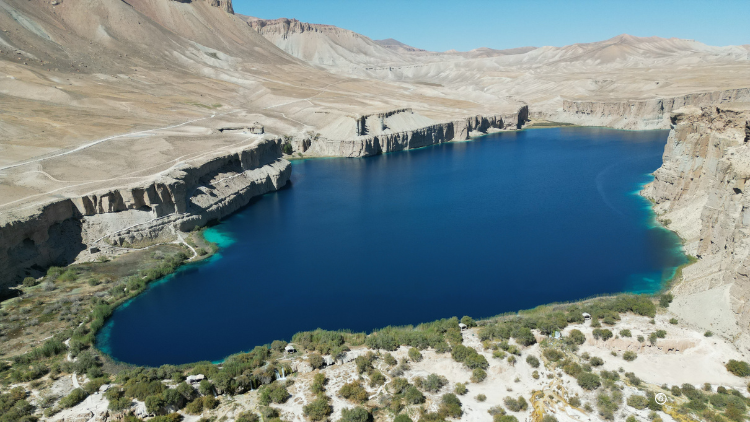Afghanistan's Water Security
Ghoshtepe Canal Project in Afghanistan and the question of water security

Band-e-amir (Bande Zulfiqar) Bamyan Afghanistan
© By Emran khan faizad from Getty Images via Canva ProThe implementation of the planned 285-kilometer Ghoshtepe Canal in Afghanistan presents the country with a bright future in terms of more than water management. Nonetheless, geopolitical polemics and logistical issues can yet jeopardize the mission. The initial process of canal construction was headed by Sardar Mohammad Dawood Khan in the 1970s, who considered the development of the canal in Afghanistan more important than access to underground minerals. The initial phase of the project built under the rule of the Taliban has run into criticism for poor construction, raising concerns about the professionalism and proficiency of the contractors.
The Ghoshtepe Canal project, devised to drive national growth through the leasing of mineral-rich areas to private investors, now encounters severe financial setbacks; this contrasts with the phase of its construction under the American administration. The current contractors face criticisms in three areas: delays in the phase contracts, their capabilities, and the mobilization of resources. In addition, there is growing skepticism about the transparency of the process. The implementation of the project entails significant expenses, utilization of modern technology, and involvement of specialized professionals, a challenge given the rampant corruption and struggling economy. The Taliban’s insistence on completing only the first stage of the canal project and their sheer lack of experience in managing complex infrastructural projects have also raised concerns about the viability (on completion) of the canal.
Employing competent professionals, solving labor union issues, and overcoming technical issues are essential to the project's success. Achieving desired outcomes and scientific water management in Afghanistan largely depends on creating accountability, and aligning the project with technical requirements and support from the international community.
The funding of the project is another important issue. The first phase of the Ghoshtepe canal reportedly costs roughly $100 million. Even though no concrete funding plan was revealed to the public, Taliban officials claim that the project's financing is impelled by tax revenue, coal mines and other local resources. The ability to undertake such a significant project without international aid has already earned praise from many Afghans. However, for a regime that suffers from international sanctions and frozen bank assets, allocating such vast sums of money to the project remains a challenge.
The project also sparked alarm amongst central Asian countries, especially Uzbekistan and Turkmenistan, as they rely on the waters of the Amu Darya to irrigate vast areas of land, with Uzbekistan utilizing it for 2.3 million hectares and Turkmenistan for 1.7 million hectares, respectively. These nations have expressed concerns about the substantial reduction in their water availability if the project achieves completion; there is yet to be an agreement between these countries on the issue of water management. Tajikistan, while not directly affected by the canal project, expresses concerns about efforts that could bolster stability for the Taliban regime in neighboring Afghanistan. The fact that the project stretches beyond Afghan borders can shape the country's diplomatic ties with neighboring nations.
Successful water management could act as a foundation for regional collaboration, leading to sustainability and shared growth in wealth. Alternatively, disagreement over the sharing of water resources among the parties can also lead to the deepening of conflict.
In summary, the Ghoshtepe Canal project has generated hopes of job generation and transformation of agriculture in landlocked Afghanistan and also encouraged nationalistic sentiments on the part of the Taliban, as it presents the same as a major undertaking and a showcase for its economic and technical abilities to handle large-scale projects. However, its financing, politicization, required technical skills, and impact on the relations between neighboring countries remain a concern.
